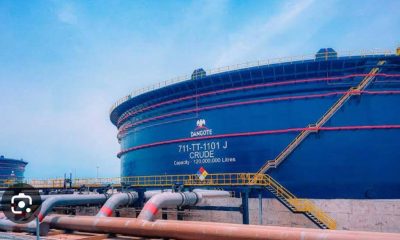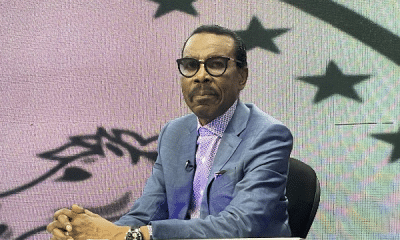Business
Will Dangote Refinery Solve Nigeria’s Problem? Economic Experts Give Insight

The Centre for the Promotion of Private Enterprise (CPPE), an economic advocacy group, has given an insight into the impact of the Dangote Refinery on Nigeria’s economy.
CPPE in its recent economic report acknowledged that Dangote Refinery when it becomes fully operational would greatly impact the growth of the downstream sector of the Nigerian economy in 2022, Naija News reports.
In the same vein, while sharing its economic report for the year 2022, a financial institution that has its name as Financial Derivatives Company Limited, observed that the Dangote refinery will put Nigeria at a peak as an exporter of refined petroleum products.
The economic group, however, noted that the native refinery would not be a final solution to the nation’s current economic crises.
The financial institution stressed that not only Nigeria, but Africa as a whole would enjoy an even enhanced product distribution.
“The coming on stream of Dangote Refinery will no doubt enhance product distribution across Africa. Will Dangote refinery solve Nigeria’s problem? The answer is no. But the company is going to make Nigeria an exporter of refined petroleum products,” the Managing Director/CEO of Financial Derivatives Company, Bismarck Rewane is quoted as saying in the report.
Meanwhile, CPPE Chief Executive Officer, Dr Muda Yusuf, had in the company’s 2022 report on Nigeria Economic Outlook, said that activation of the Petroleum Industry Act (PIA) in 2022 is expected to impact positively on the nation’s economic outlook.
“We expect to see positive outcomes as investor sentiments in the oil and gas sector improve on account of the reforms anchored on the PIA. This will however depend on the political will deployed to drive the implementation of the provisions of the Act. It is also expected that the coming on stream of the Dangote refinery in 2022 will also impact positively on the downstream sector of the economy,” RipplesNigeria quoted Yusuf as saying.
The economic expert pointed out that the average oil price in 2022 was expected to exceed the budgeted benchmark of sixty-two dollars ($62) per barrel, offering some fiscal headroom.
This according to Yusuf, would be powered by higher energy demand driven by the recovery of economic activities globally, Naija News reports.
He added: “This trajectory is expected to impact on our foreign reserve and strengthen the capacity of the Central Bank of Nigeria (CBN) to support the foreign exchange market”.
Also not disputing the fact that the Dangote refinery if it becomes fully operational in 2022, will subside the fiscal pressure on the economy, Yusuf said this would not be an end to the nation’s economic crisis.
According to the economist, because the service sector was less vulnerable to the structural constraints of the economy, especially the real sector of the economy, it will continue to outpace the real sector in 2022.
He said, “The service sector of the Nigerian economy will continue to outpace the real sector in 2022. In the third quarter of 2021, service sector contribution to GDP was 50 per cent and the growth of the sector was 8.41 per cent. The oil sector contribution to GDP was 7.5 per cent while the non-oil sector contribution was 92.5 per cent. While the industrial sector growth contracted by 1.63 per cent, agriculture grew by 1.2 per cent.”
He noted that the Gross Domestic Product (GDP) growth would remain fragile at about three per cent, pointing out that the key expected drivers of growth would be sustained recovery of global oil price.
The economist added: “We expect that the average oil price in 2022 will exceed the budgeted benchmark of $62 per barrel, offering some fiscal headroom.
“This would be powered by higher energy demand driven by the recovery of economic activities globally.”
The economist noted that despite the downside risks, the economy would continue to present huge opportunities for investors across all sectors, Naija News reports.
“This is on account of the resourcefulness of the Nigerian people, especially the entrepreneurs. Other inherent strengths of the Nigerian economy include the market size, the population, and the demographic characteristics”, he added.












